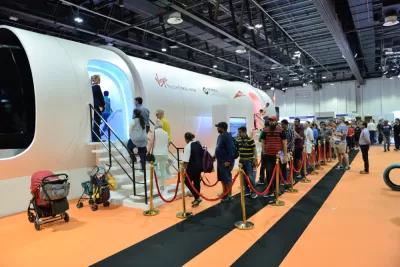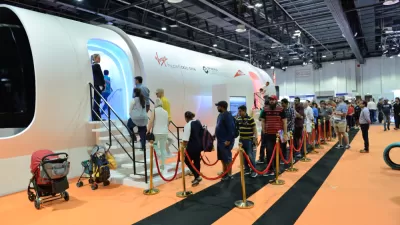The company sees cargo as a more promising and cost-efficient use of its technology.

Virgin Hyperloop is pivoting from moving passengers to transporting cargo and has laid off close to half of its employees, reports James Vincent in The Verge. "A spokesperson for Virgin Hyperloop told the [Financial Times] that the recent cuts would allow the company 'to respond in a more agile and nimble way and in a more cost-efficient manner' and that the decision to lose so many staff at once had not been 'taken lightly.'"
The US-based Virgin Hyperloop is one of the leading firms developing the eponymous technology — an updated version of a centuries-old idea to reduce the energy demands of trains by placing them in vacuum-sealed tubes where air resistance is minimal. The concept was resurrected in 2013 when Elon Musk published a whitepaper on the subject, incorporating magnetic levitation used by bullet trains and bestowing the current branding.
Despite early successes in testing, Vincent notes that Virgin Hyperloop has struggled to attract enough funding and reach additional milestones. "Moving cargo instead of people will simplify safety and regulatory burdens, according to DP World — an Emirati, state-owned logistics group that has a 76 percent stake in Virgin Hyperloop."
FULL STORY: Virgin Hyperloop switches focus from passengers to cargo as it lays off half its staff

Study: Maui’s Plan to Convert Vacation Rentals to Long-Term Housing Could Cause Nearly $1 Billion Economic Loss
The plan would reduce visitor accommodation by 25,% resulting in 1,900 jobs lost.

North Texas Transit Leaders Tout Benefits of TOD for Growing Region
At a summit focused on transit-oriented development, policymakers discussed how North Texas’ expanded light rail system can serve as a tool for economic growth.

Why Should We Subsidize Public Transportation?
Many public transit agencies face financial stress due to rising costs, declining fare revenue, and declining subsidies. Transit advocates must provide a strong business case for increasing public transit funding.

How to Make US Trains Faster
Changes to boarding platforms and a switch to electric trains could improve U.S. passenger rail service without the added cost of high-speed rail.

Columbia’s Revitalized ‘Loop’ Is a Hub for Local Entrepreneurs
A focus on small businesses is helping a commercial corridor in Columbia, Missouri thrive.

Invasive Insect Threatens Minnesota’s Ash Forests
The Emerald Ash Borer is a rapidly spreading invasive pest threatening Minnesota’s ash trees, and homeowners are encouraged to plant diverse replacement species, avoid moving ash firewood, and monitor for signs of infestation.
Urban Design for Planners 1: Software Tools
This six-course series explores essential urban design concepts using open source software and equips planners with the tools they need to participate fully in the urban design process.
Planning for Universal Design
Learn the tools for implementing Universal Design in planning regulations.
Ascent Environmental
Borough of Carlisle
Institute for Housing and Urban Development Studies (IHS)
City of Grandview
Harvard GSD Executive Education
Toledo-Lucas County Plan Commissions
Salt Lake City
NYU Wagner Graduate School of Public Service




























